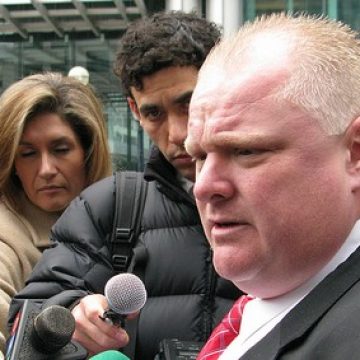Donation Saga:
![]() Back when Rob Ford was a councillor, he used city stationary to solicit donations for the Don Bosco Eagles, his football foundation. The city’s integrity commissioner Janet Leiper ruled in August 2010 that his actions breached parts of the councillors’ code of conduct dealing with gifts and benefits, use of city resources and improper influence. Council agreed and demanded that Ford repay the $3,150 he had raised from donors. Ford refused and rebuffed six requests to do so from the integrity commission.
Back when Rob Ford was a councillor, he used city stationary to solicit donations for the Don Bosco Eagles, his football foundation. The city’s integrity commissioner Janet Leiper ruled in August 2010 that his actions breached parts of the councillors’ code of conduct dealing with gifts and benefits, use of city resources and improper influence. Council agreed and demanded that Ford repay the $3,150 he had raised from donors. Ford refused and rebuffed six requests to do so from the integrity commission.
Council raised the matter again in February 2012. Ford, now mayor, participated in the debate over repaying the donors, and voted in favour of a motion to excuse himself from repaying the money. A month later, Toronto resident Paul Magder complained to the Ontario Superior Court of Justice that Mr. Ford’s actions had broken section 5(1) of the Municipal Conflict of Interest Act, which covers how politicians handle matters in which they have a pecuniary interest.
In September, the case was heard by Justice Charles Hackland during a three-day trial. In court, when asked by Magder’s lawyer, Clayton Ruby, if he understood the Conflict of Interest Act, Ford testified that he had never read it or attended the relevant councillor training sessions. Hackland ruled on November 26, 2012, that Ford had violated the conflict of interest law and ordered him to step down as mayor. Hackland wrote that his decision did not disqualify the mayor beyond the end of the “current term.” This phrasing has caused some dispute. While Ford’s lawyer, Alan Lenczner, said it meant Ford would be free to run again almost immediately, Anna Kinastowski — head of the city’s legal department — interpreted the word “term” as meaning 2010 to 2014.
Ford and Lenczner filed a formal appeal and a request for a stay of the decision on Tuesday, November 27. Ford will remain mayor of Toronto until at least December 10, as Hackland suspended the punishment for 14 days. After Ford’s application for a stay is heard on December 5, the appeal hearing itself will begin January 7.
Update, November 30: Justice Hackland has agreed to remove the reference to “current term” in his decision, which suggested Ford would not be eligible to run again until 2014. This means that Ford is eligible to run in a by-election.
Update, December 5: Justice Gladys Pardu grants Ford’s application to stay as mayor until the appeal process concludes. Ford’s appeal of the removal order issued by Justice Hackland will be heard in Ontario Divisional Court on January 7.
Campaign finance case:
![Image: By ScottSteiner (Own work) [Public domain or Public domain], via Wikimedia Commons](https://lawandstyle.ca/wp-content/uploads/2012/11/Dollar_Sign.svg_-300x300.png) In April 2011, two residents, Max Reed and Adam Chaleff-Freudenthaler, filed a complaint that Rob Ford committed serious violations of provincial election finances law.
In April 2011, two residents, Max Reed and Adam Chaleff-Freudenthaler, filed a complaint that Rob Ford committed serious violations of provincial election finances law.
Reed and Chaleff-Freudenthaler allege Ford wrongfully classified certain costs under fundraising expenses, which are exempt from the campaign-spending limit. The residents also allege that Ford violated both provincial and municipal election rules by accepting $77,722 from Doug Ford Holdings Inc. Campaign finance law states that candidates can only borrow from a bank and cannot accept corporate donations.
Ford appealed but later dropped his appeal so the audit could proceed. Results are pending.
$6M defamation case:
 In a $6 million libel case against him, Ford is accused of suggesting that George Foulidis, the owner of Tuggs Inc., which runs the Boardwalk Pub at Ashbridges Bay, bribed people at city hall in exchange for political favours. In an August 2010 Toronto Sun editorial board meeting, Ford claimed — based on anonymous phone calls and a personal hunch — that Foulidis’s 20-year restaurant deal with the city is “an example of corruption and skulduggery.”
In a $6 million libel case against him, Ford is accused of suggesting that George Foulidis, the owner of Tuggs Inc., which runs the Boardwalk Pub at Ashbridges Bay, bribed people at city hall in exchange for political favours. In an August 2010 Toronto Sun editorial board meeting, Ford claimed — based on anonymous phone calls and a personal hunch — that Foulidis’s 20-year restaurant deal with the city is “an example of corruption and skulduggery.”
During the November 2012 trial, Ford’s lawyer Gavin Tighe argued that under “fair comment” rights, politicians are allowed to “ventilate” issues of public importance, as long as it’s rooted in some fact. Foulidis’s lawyer, Brian Shiller — Clayton Ruby’s law firm partner — reported that the court had not heard any facts to support Ford’s claim of “corruption.”
The decision for the case is expected in about two months.
Miscellaneous misdemeanors:
A picture of Rob Ford reading while driving on the Gardiner made the rounds of Twitter in August 2012. His response was that he probably was reading because he’s a “busy man.” Toronto Police have urged him to get a driver.
Ford also got into a bit of trouble in the world of social media when a woman posted on Facebook that he had given her the finger after she told him off for using his cell phone while driving. The woman was dropping off her daughter’s babysitter, with her six-year-old daughter in the car, when she spotted Ford.
Image: West Annex News via Flickr


